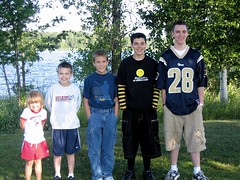Very Inspiring Blogger Award

This award comes from Sherry Ellis at Mama Diaries. One of the rules is to list seven things about myself. I've said so much about myself between this blog and my other blogs that it's getting difficult to come up with new things. So how about some facts about my education:
- I attended three different elementary schools.
- I attended two different junior high school.
- I graduated from high school in Tennessee in 1969.
- Nearly becoming a career college student, I attended the University of Tennessee in Knoxville for 5 years without graduating.
- Initially I majored in psychology, then switched to English and was working on a teaching certification when I dropped out to "experience life".
- I finally got a B.S. Degree in Business Management at the University of Phoenix in La Mirada, California in 2007.
- I consider myself a lifelong learner as I've taken a variety of courses in varying formats throughout the years. I enjoy reading and watching videos on an assortment of topics. If I could afford it I probably would become that career college student that I threatened to become so many years ago. I love the educational environment.
Kreativ Blogger Award
| Kreativ Blogger Award (Photo credit: jiihaa) |
Gossip Girl presented me with a Kreativ Blogger Award at her Just You Wait! One Day I Will. blog. I'm not sure if this is the same Gossip Girl that I thought it was as the link doesn't work anymore. But here's what whoever-it-is kindly said: "You have several blogs that you keep up to, and not sure how you do it but they are all great. If anyone deserves the Kreative Bloggers Award it would be you so, stopping thru to let ya know that I am sharing the blogging love of a blog award to you."
She offered this award on my A Few Words blog but since I do not do awards and such there I decided that it would be better to acknowledge it here. Sorry that this got so confused and I thank the blogger who bestowed this one upon me.
So, this is what I need to do, Answer the 10 questions and list 10 random facts about me.
Questions Are:
1. What is your fave song? Now that's a tough one because there are too many with no one favorite--it would have to be a list. A long, long list. I love music.
2. Favorite dessert? Oh come on, I love them all. One that pops into mind is the Molten Lava Chocolate Cake from Chili's.
3. What ticks you off? People getting ticked off. Anger can be contagious and very unproductive.
4. When you're upset what do you do? Get real quiet and withdrawn.
5. Which is / was you favorite pet? My dog, Blackie, from back in my college days. Actually I had two dogs named Blackie and I liked both of them.
6. Which do you prefer, black or white? It all depends. I prefer to wear black, but a snowy white day is a beauty to behold.
7. What is your biggest fear? Chenille bedspreads.
8. What is your attitude mostly? Contented.
9. What is perfection? God
10. What is your guilty pleasure? Old movie musicals.
Ten Random Things About Me:
- I like to work crossword puzzles.
- I very rarely wear a suit and tie.
- My first songwriter hero was Stephen Foster.
- I had a short stint operating the spotlight at a carnival girlie show.
- Thai food is one of my favorite cuisines.
- I like to drive, especially on long distance trips.
- I have a bad habit of saving newspapers.
- I didn't learn how to swim until I was in college
- I used to swear I would never own a computer.
- Now I spend too much time on the computer.
Versatile Blogger Award

I also received another Versatile Blogger award, this time from Lori at Habitual Rhymer. Thank you, Lori. I think I fulfilled the requirements above.
Sunshine Award

Diane Kratz at Profiles of Murder gave me this Sunshine Award for my Tossing It Out blog. I see a certain irony in that, but I thank Diane for the Sunshine. Once again I will forego the questions on this and defer to the ones I've already answered.
Another Versatile Blogger Award!
 Gossip Girl also gave me a Versatile Blogger Award for my Faraway View blog. This time I know which Gossip Girl this is--Thank you! Again, I'm done with the questions and facts.
Gossip Girl also gave me a Versatile Blogger Award for my Faraway View blog. This time I know which Gossip Girl this is--Thank you! Again, I'm done with the questions and facts.
I'm also done with the awards. Have a Happy New Years everyone!
Diane Kratz at Profiles of Murder gave me this Sunshine Award for my Tossing It Out blog. I see a certain irony in that, but I thank Diane for the Sunshine. Once again I will forego the questions on this and defer to the ones I've already answered.
Another Versatile Blogger Award!
 Gossip Girl also gave me a Versatile Blogger Award for my Faraway View blog. This time I know which Gossip Girl this is--Thank you! Again, I'm done with the questions and facts.
Gossip Girl also gave me a Versatile Blogger Award for my Faraway View blog. This time I know which Gossip Girl this is--Thank you! Again, I'm done with the questions and facts.I'm also done with the awards. Have a Happy New Years everyone!





.jpg)